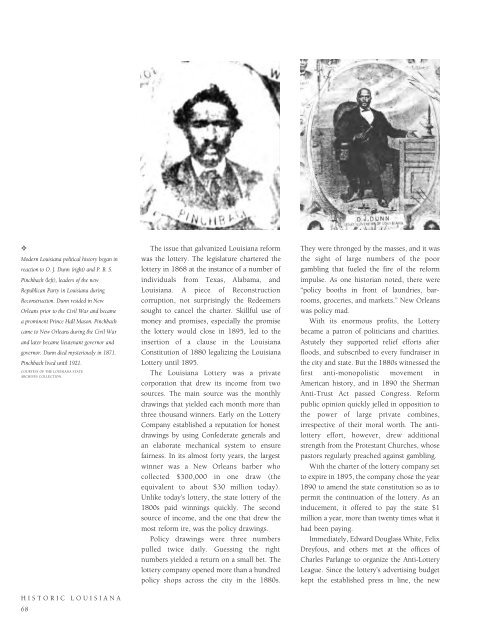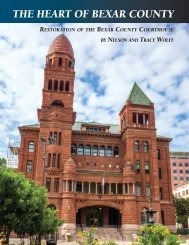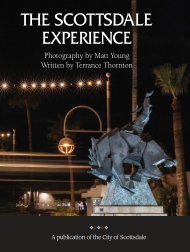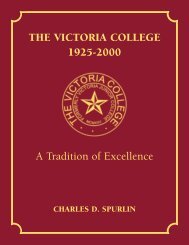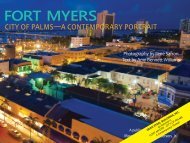Historic Louisiana
An illustrated history of Louisiana, paired with the histories of companies, families and organizations that make the state great.
An illustrated history of Louisiana, paired with the histories of companies, families and organizations that make the state great.
You also want an ePaper? Increase the reach of your titles
YUMPU automatically turns print PDFs into web optimized ePapers that Google loves.
✧<br />
Modern <strong>Louisiana</strong> political history began in<br />
reaction to O. J. Dunn (right) and P. B. S.<br />
Pinchback (left), leaders of the new<br />
Republican Party in <strong>Louisiana</strong> during<br />
Reconstruction. Dunn resided in New<br />
Orleans prior to the Civil War and became<br />
a prominent Prince Hall Mason. Pinchback<br />
came to New Orleans during the Civil War<br />
and later became lieutenant governor and<br />
governor. Dunn died mysteriously in 1871.<br />
Pinchback lived until 1921.<br />
COURTESY OF THE LOUISIANA STATE<br />
ARCHIVES COLLECTION.<br />
HISTORIC LOUISIANA<br />
68<br />
The issue that galvanized <strong>Louisiana</strong> reform<br />
was the lottery. The legislature chartered the<br />
lottery in 1868 at the instance of a number of<br />
individuals from Texas, Alabama, and<br />
<strong>Louisiana</strong>. A piece of Reconstruction<br />
corruption, not surprisingly the Redeemers<br />
sought to cancel the charter. Skillful use of<br />
money and promises, especially the promise<br />
the lottery would close in 1895, led to the<br />
insertion of a clause in the <strong>Louisiana</strong><br />
Constitution of 1880 legalizing the <strong>Louisiana</strong><br />
Lottery until 1895.<br />
The <strong>Louisiana</strong> Lottery was a private<br />
corporation that drew its income from two<br />
sources. The main source was the monthly<br />
drawings that yielded each month more than<br />
three thousand winners. Early on the Lottery<br />
Company established a reputation for honest<br />
drawings by using Confederate generals and<br />
an elaborate mechanical system to ensure<br />
fairness. In its almost forty years, the largest<br />
winner was a New Orleans barber who<br />
collected $300,000 in one draw (the<br />
equivalent to about $30 million today).<br />
Unlike today’s lottery, the state lottery of the<br />
1800s paid winnings quickly. The second<br />
source of income, and the one that drew the<br />
most reform ire, was the policy drawings.<br />
Policy drawings were three numbers<br />
pulled twice daily. Guessing the right<br />
numbers yielded a return on a small bet. The<br />
lottery company opened more than a hundred<br />
policy shops across the city in the 1880s.<br />
They were thronged by the masses, and it was<br />
the sight of large numbers of the poor<br />
gambling that fueled the fire of the reform<br />
impulse. As one historian noted, there were<br />
“policy booths in front of laundries, barrooms,<br />
groceries, and markets.” New Orleans<br />
was policy mad.<br />
With its enormous profits, the Lottery<br />
became a patron of politicians and charities.<br />
Astutely they supported relief efforts after<br />
floods, and subscribed to every fundraiser in<br />
the city and state. But the 1880s witnessed the<br />
first anti-monopolistic movement in<br />
American history, and in 1890 the Sherman<br />
Anti-Trust Act passed Congress. Reform<br />
public opinion quickly jelled in opposition to<br />
the power of large private combines,<br />
irrespective of their moral worth. The antilottery<br />
effort, however, drew additional<br />
strength from the Protestant Churches, whose<br />
pastors regularly preached against gambling.<br />
With the charter of the lottery company set<br />
to expire in 1895, the company chose the year<br />
1890 to amend the state constitution so as to<br />
permit the continuation of the lottery. As an<br />
inducement, it offered to pay the state $1<br />
million a year, more than twenty times what it<br />
had been paying.<br />
Immediately, Edward Douglass White, Felix<br />
Dreyfous, and others met at the offices of<br />
Charles Parlange to organize the Anti-Lottery<br />
League. Since the lottery’s advertising budget<br />
kept the established press in line, the new


